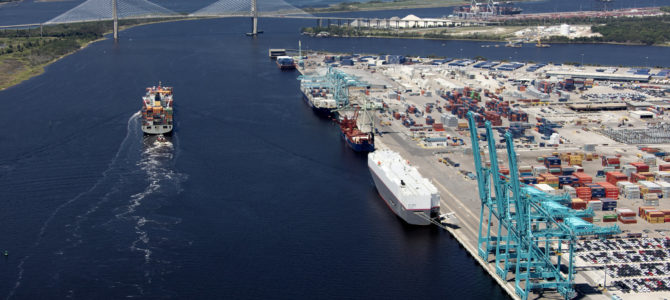
If the largest trade deals in U.S. history have any chance of becoming law, they will require an unusual alliance between the Obama administration and pro-trade Republicans. An emerging consensus is that this union could be tested soon, with the upcoming “lame duck” session of Congress considering a procedural bill called “Trade Promotion Authority” that would smooth both negotiation and congressional consideration of U.S. free trade agreements.
For TPA to pass (now or next year), President Obama and Republicans will need to work together to overcome opposition from Democrats allied with traditional anti-trade groups, like environmentalists and labor unions. But if you ask the media and some on Capitol Hill, these strange pro-trade bedfellows face a new threat: a “Tea Party” caucus that could rebel against the Republican agenda to spite the president or scuttle FTAs. Though it makes for titillating political journalism (and a great scapegoat for a divided Democratic Party), the “Tea Party opposes trade” narrative is a myth that grows from fundamental misunderstandings of who the Tea Party is, how U.S. trade agreements work, and what “free trade” actually means.
Despite years of ineptitude, the United States might (maybe!) soon conclude the Trans-Pacific Partnership. The TPP is a free-trade agreement with 11 other countries that, for all its imperfections, would undoubtedly open new markets abroad and improve living standards here at home. The Obama administration is also working to secure a deal with the European Union—the Transatlantic Trade and Investment Partnership(TTIP) —that would remove tariff and regulatory barriers to trade between two of the world’s largest economies. However, President Obama’s chief negotiator, U.S. Trade Representative Michael Froman, has recently made clear that these benefits can only materialize when Congress approves not only the FTAs (which require congressional approval), but also the TPA bill that governs the approval process.
Piggybacking Onto the Tea Party
The possibility that TPA could be passed during the lame-duck session or early next year has mobilized trade critics, and a coalition of unions and other left-wing groups will descend on Capitol Hill this week to protest any near-term consideration of the bill. Most of these protests will target trade-skeptical Democrats, but a new group of activists will seek to sway Republicans by claiming, among other things, that TPA is an unconstitutional power grab by the Obama administration that would erode U.S. sovereignty and, by easing passage of the TPP and TTIP, destroy American jobs. By nicknaming TPA “Obamatrade” and attaching the familiar slogan “if you like your job, you can keep your job,” this “conservative” group’s attempt to pander to partisan animosity is clear. Nevertheless, the crux of their message and their goal of scuttling TPA, TPP, and the TTIP aligns not with the pro-market Right but with the AFL-CIO and other left-wing groups who routinely push outlandish claims to fight globalization and economic freedom.
Perhaps taking a cue from previous Obama administration attempts to deflect blame for its trade policy foibles onto the Tea Party, the media have run with the exciting new narrative that unpredictable, nativist right-wingers, not just those well-meaning-but-ill-informed lefties, pose a threat to the U.S. trade agenda. The problem with this narrative is that it’s completely false. In reality, the Obamatrade campaign is the dying gasp of protectionist dinosaurs still haunting the Republican Party, and any member of Congress or the media who falls for this anti-trade message, or the notion that Obamatrade represents the modern conservative grassroots, deserves to be laughed out of his job.
The Case for Trade, FTAs, and TPA
The case for free trade is simple and decisive. Not only is there overwhelming economic consensus as to the benefits of open markets for American consumers, workers, and companies, but the antithesis of free trade—protectionism—is clearly an immoral use of government force to thwart voluntary private transactions, raise domestic prices, and thereby line the pockets of a few, well-connected cronies. Protectionism raises costs, lowers living standards, and redistributes money from American families and businesses (more than half of all imports are industrial inputs and machinery) to a handful of firms that have successfully lobbied the government to inhibit foreign competition through forcible, non-market means.
The politics of trade, however, are not nearly so simple. Specific subsidies and trade barriers concentrate benefits on workers and firms that hire lobbyists and influence politicians to erect or maintain such policies. At the same time, this protectionism’s diffuse costs to American consumers are typically insufficient to motivate them to lobby against the cronyism. As a result, self-interested politicians—many of whom have opportunistic factories or farms in their districts—frequently grant the hard-lobbying groups special anti-trade favors, fully aware that free trade is the best economic policy for the country as a whole, and that protectionist votes hurt the vast majority of the American public, especially its most vulnerable. One needs look no further than the costly, immoral U.S. sugar program to see these principles in all-too-depressing action.
Although unilaterally eliminating import and export barriers is the most direct and obvious way to maximize the moral and economic gains from trade, the reason we’ve seen substantial liberalization of trade over the last half century is because the United States has engaged in “reciprocal” agreements like NAFTA and the GATT that lower trade barriers at home and abroad. The value of reciprocal agreements is primarily political: by tying open domestic markets to open foreign markets, reciprocal agreements counterbalance opposition from import-competing businesses with support from exporters who both benefit from new market access and face potential retaliation from trading partners for any protectionist backsliding by the U.S. government.
While imperfect, reciprocal trade deals still generate significant, positive economic results and enhance consumer freedom. As a result, there is quite literally no mainstream policy on which economists—left, right, and center—agree more than U.S. FTAs.
Although trade agreements provide a mechanism for overcoming political opposition to free trade, they also create new political problems of their own, most of which stem from the inherent conflict in the U.S. Constitution between the power granted to Congress to “regulate commerce with foreign nations” (Article I, Section 8) and that granted to the president to negotiate treaties (Article II, Section 2) and otherwise act as the “face” of U.S. international relations. In short, the executive branch is authorized to negotiate trade agreements that escape much of the legislative sausage-making that goes in Washington, but, consistent with the Constitution, any such deals still require congressional approval—a process that could alter the agreement’s terms via congressional amendments intended to appease influential constituents. The possibility that, after years of negotiations, an unfettered Congress could add last-minute demands to an FTA (or eliminate its biggest benefits) discourages all but the most eager U.S. trading partners to sign on to any such deal.
Fast Track Preserves Congressional Authority
TPA, also known as “fast track,” was designed to fix this problem. TPA is an arrangement between the U.S. executive and legislative branches, under which Congress agrees to hold a timely, up-or-down vote (i.e., no amendments) on future trade agreements in exchange for the president agreeing to follow certain negotiating objectives set by Congress and to consult with the legislative branch before, during, and after FTA negotiations. In essence, Congress agrees to streamline the approval process as long as the president negotiates agreements that it likes.
By moving Congress’s input to an earlier, less disruptive stage, TPA is a win-win for Congress and the president. It prevents members of Congress from changing an already-completed agreement or from holding it hostage in committee, and it gives members multiple chances to advance their pet issues through consultations and negotiating objectives. Indeed, the most recently proposed TPA bill includes more than 70 pages of congressional objectives, all of which limit the president’s room to negotiate (for better or worse). If the president ignores these demands, Congress can reject the final FTA’s implementing legislation, and there’s nothing the president can do about it.
Although TPA assists the negotiation and implementation of U.S. FTAs, it also gives opponents of trade an extra opportunity to derail the agenda (hence, the current lobbying campaign). Their anti-TPA arguments consist of not only the usual opposition to trade liberalization, but also specific criticism of TPA that has little to do with trade policy. These non-trade arguments, however, are just as wrong as the protectionist ones. First, the claim that TPA unconstitutionally cedes power over trade policy to the executive branch ignores the actual text of the law and the agreements that it governs. The formal authority to “regulate trade” still rests with Congress via its final vote on a trade agreement, and the president maintains his constitutional authority to enter into international agreements with Senate consent. In fact, TPA actually increases Congress’s role in the process by directing the content of a trade agreement before it’s completed, by constant consultations, and giving the House of Representatives a vote. Moreover, TPA and every completed agreement expressly reaffirm that FTA provisions cannot force changes in U.S. domestic law, and Congress retains plenary authority to make such changes. For these and other reasons, a long line of conservative constitutional scholars—including Judge Robert Bork and former Attorney General Ed Meese—have found TPA to be perfectly constitutional.
Second, TPA does not enable trade agreements to be negotiated in secret, and this claim, in fact, gets things completely backwards. There is a legitimate debate about whether trade negotiations should be more transparent, but TPA’s consultations requirements give Congress more control over that transparency, not less. Concerns about transparency can and should inform a TPA bill and the broader debate over FTAs, but accusations of TPA’s excessive secrecy are simply not credible.
Third, TPA and U.S. trade agreements are not an assault on American sovereignty, contrary to the “Obamatrade” clams. FTAs embody unenforceable promises governments make to each other. Domestic governments—here, Congress—retain the sole authority to ignore those promises and violate international commitments, and they (unfortunately) do so frequently. Foreign governments cannot force their trading partners to comply with the terms of an FTA—the only extra-national consequence of a violation is that other parties to the agreement may abrogate their commitments in a commensurate amount (e.g., by raising tariffs on imports from the United States from levels that were lowered in the FTA). Moreover, every U.S. trade agreement permits the parties to act outside the agreed disciplines in the name of, among other things, national security, public health and safety, or environmental protection. Thus, the idea that TPA and FTAs violate U.S. sovereignty or regulatory autonomy is patently false.
The political wrangling that goes into creating reciprocal trade agreements is messy, but they have thus far proven to be the most successful mechanism to substantially reduce U.S. trade barriers. Without our FTAs, protectionist rent-seeking could close the United States off from the global economy, and Americans would be stuck working harder for less money. If politicians were angels, FTAs wouldn’t be necessary. But we all know better, now, don’t we?
Blame-Shifting to the Tea Party on Trade
So where does the Tea Party fit into all of this? In principle, of course, the “pure” free market, Tea Party position would be one of unconditional, unilateral free trade and a deep aversion to protectionism. The libertarian populism that animates the movement demands an end to tax-and-spend cronyism, as well as tariffs (which are taxes on import consumers), subsidies, and industrial policy that enrich politically-connected businesses at the expense of consumers and U.S. economic growth more broadly. For this reason, the political groups most closely associated with the Tea Party movement—the Club for Growth, Heritage Action, FreedomWorks and Americans for Prosperity, for example—have consistently supported free trade and FTAs and opposed the Republican establishment when its members sought restrict international transactions or subsidize certain participants. Some of the largest Tea Party grassroots groups—such as the Tea Party Express—also have consistently supported free trade, even TPA.
The Tea Party’s practical impact on U.S. trade policy has been equally clear. As the Cato Institute’s congressional free trade ratings make clear, since 2011 the new Republican members of Congress, as well as veterans who have latched onto the Tea Party label, have cast votes for free trade much more often than Republicans at large, even when it was more politically expedient to embrace subsidies or protectionism. Most notably, it was tea partiers in Congress who opposed popular bipartisan boondoggles like the Export-Import Bank, farm bill, sugar quotas, and Chinese currency sanctions. They also joined the rest of the Republican caucus to support U.S. FTAs with Korea, Colombia, and Panama when those deals were finally put to a vote in 2011, and have voiced little—if any—opposition to President Obama’s so-far-futile quest for TPA. Indeed, many Tea Party champions in Congress, such as Sen. Mike Lee, openly support it.
These same Tea Party members have been rewarded for their principled trade stance by the aforementioned conservative PACs and pressure groups that key-voted “NO” on a number of trade bills despite broad Republican support. The Tea Party members have risen to the top of those groups’ rankings in part for bucking their party in support of free trade, regardless of its form or political ramifications.
So why, then, the persistent media and political confusion about the Tea Party’s stance on FTAs and TPA (aside from the president’s own blame-shifting and elitist skepticism of the Tea Party more generally, we mean)? One big reason is that the Tea Party’s small-government, free-market populism has drawn the ire of Big Business, which generally supports FTAs, since the 2010 election. So the beltway media—helped by lobbyist contacts eager to portray the Tea Party as troglodytic anarchists—mistake disagreement between K Street and the Tea Party on subsidies and industrial policy for total disagreement on all issues, including those like FTAs that actually reduce government interference in free markets.
The fight over the Ex-Im Bank, where a conservative faction of the GOP has been able to block clean reauthorization, is a perfect example of this dynamic: echoing President Obama, pro-business lobbyists like the U.S. Chamber of Commerce portrayed Tea Party opposition to the bank’s export subsidies as anti-free trade, when it was actually a principled stance against corporate welfare and mercantilism. The media, however, failed (or refused) to grasp this nuance and instead embraced the silly notion that the Tea Party was poised to turn its anti-trade sights on TPA and the trade agreements it’s intended to support. Hopefully the aforementioned facts will disavow them of this belief, but we’re not holding our breaths.
So Who Is Obamatrade?
The media also failed to investigate the Obamatrade campaign and took its claims to represent the Tea Party at face value. In reality, however, there is no singular voice for the Tea Party (unlike for the RNC or DNC), and the “conservative” opposition to FTAs and TPA has little more to do with the Tea Party than using its name. For example, the campaign’s most prominent voice is Judson Phillips, controversial proprietor of Tea Party Nation, the for-profit entity that routinely finds itself in trouble and clearly does not speak for the entire movement.
And while the Obamatrade campaign is certainly targeting that faction of the Republican base, their ideas and motivations are more closely aligned with an earlier conservative grassroots movement that has long since been replaced by one more supportive of free-market competition. Unlike the libertarian populism of the real, mainstream Tea Party movement, the Obamatrade campaign is fueled by a form of economic nationalism better associated with Pat Buchanan and Phyllis Schlafly, whose writings and videos are featured prominently on the group’s website. That website is hosted by the American Jobs Alliance, a retrograde organization that advocates using industrial policy and high tariffs to “bring back” American jobs that were “shipped overseas” by “global corporations” (cue ominous music). These folks are full-throated protectionists who believe in cutting off the United States from the global economy. Such archaic, misguided economic views echo the views of U.S. labor unions and the far, far Left, not grassroots conservatives.
Because the Obamatrade denizens have very little in common with the small-government, free-market ethos that’s driving the conservative grassroots today, they most often make their case in purely non-economic terms. They talk about sovereignty, the constitution, state’s rights, and even foreign persecution of Christians in order to paint the TPP as President Obama’s secret plot to enact global government. Rather than simply admit that they oppose foreign trade, the Obamatrade campaign relies on scary mischaracterizations of TPA, FTAs like the TPP, and the political process for making them. As already explained, such claims have no basis in reality and should therefore be rejected by grassroots conservatives, journalists and everyone else.
Don’t Believe the Hype
Contrary to the conventional wisdom, it’s an open question as to whether the new makeup of Congress will more amenable to advancing U.S. trade policy in the coming months. But if it is, and if TPA climbs to the top of the United States’ legislative agenda, two things are clear:
First, if grassroots conservatives feel strongly about free-trade purity and the faults of the reciprocal trading system, then they can and should feel free to criticize TPA and President Obama’s troublesome negotiation of U.S. FTAs on these very legitimate grounds. For the reasons outlined, we disagree with that stance because FTAs represent the only realistic means of liberalizing trade in the current political environment, but we can’t fault critics’ intentions or principles.
On the other hand, if TPA, the TPP, or any other reciprocal trade legislation ever does come up for a vote in Congress, tea partiers and their congressional representatives would be fools to oppose the bills due to “Obamatrade.” The principled free marketers in the Tea Party have rightly complained about being unfairly tarred by the media, K Street, and establishment politicians as clueless, nativist hicks. Those claims are pernicious and absurd for anyone actually paying attention, but support for “Obamatrade,” especially given its leadership, would do nothing but reinforce the stereotype.
Second, if TPA fails in Congress, there will be plenty of blame to go around: a Democratic Party that has abandoned the longstanding pro-trade consensus in the United States, a Republican Party committed to corporatist carve-outs and subsidies that undermine FTAs’ free market goals, and, perhaps most at fault, a president who has never—not once—put trade policy principles ahead of his and his party’s base political ambitions. These politicians will inevitably blame outside groups, including the Tea Party, for their unprincipled or misguided votes, and some in the media will be quick to echo these views. However, after almost six years in existence, the Tea Party and its congressional champions have repeatedly demonstrated their unparalleled commitment to free markets and free trade. Thus, unless the Tea Party and its friends in Congress radically change course (and ignore our first conclusion), any reporter who blames the Tea Party for the failure of U.S. trade policy is ignoring reality and committing journalistic malpractice.









